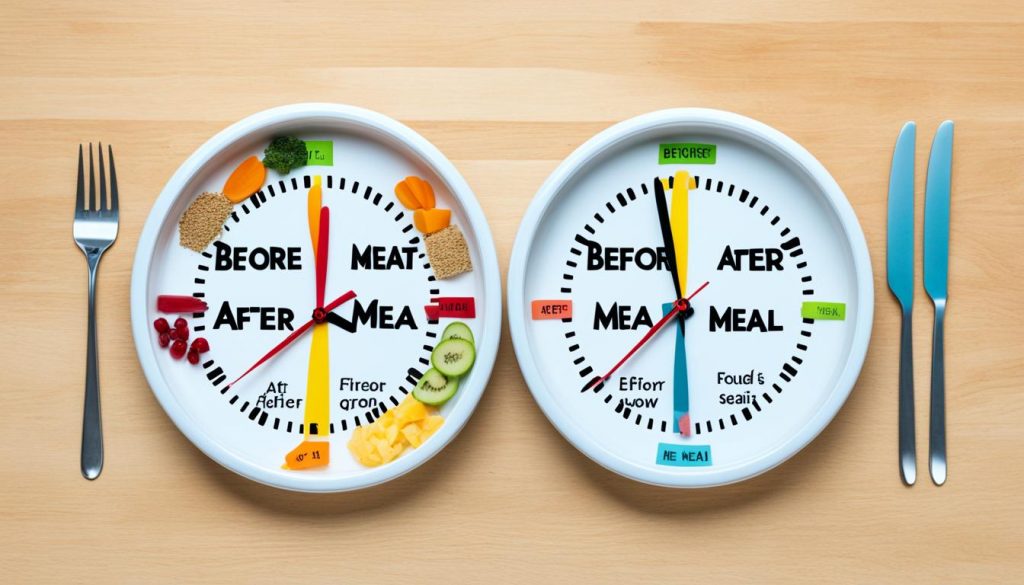Fiber, a type of carbohydrate, is essential for maintaining a healthy digestive tract. While including fiber-rich foods in your diet is important, there may be times when supplementation is necessary to meet your daily fiber needs. But when is the best time to take fiber supplements? And how much should you take?
Let me share a relatable story to set the stage for our discussion. Meet Lisa, a busy professional who values her health but finds it challenging to consume enough fiber in her daily meals. Despite her efforts to incorporate fruits, vegetables, and whole grains into her diet, she often falls short of the recommended fiber intake. This leads to occasional digestive discomfort and irregular bowel movements.
Looking for a solution, Lisa decides to explore fiber supplements. She understands that fiber supplements can provide a concentrated dose of fiber, but she has questions about when and how to take them.
As Lisa embarks on her research journey, she discovers valuable information about the optimal timing for taking fiber supplements and the recommended dosages. Armed with this knowledge, Lisa can make informed choices about incorporating fiber supplements into her daily routine, ensuring optimal efficiency and effectiveness.
Key Takeaways:
- Timing is crucial when taking fiber supplements.
- It’s best to start with small amounts and gradually increase the dosage.
- Take fiber supplements separately from medications and other supplements.
- Consult with your healthcare professional for personalized advice on fiber supplement dosages and recommendations.
- Maintaining a balanced diet and lifestyle is essential for optimal health.
The Benefits of Fiber Supplements
Fiber supplements, whether soluble or insoluble, offer a range of health benefits.
Stool Regularity
Fiber supplements can aid in promoting regular bowel movements, preventing constipation, and maintaining digestive health.
Healthy Digestive Tract
By increasing your fiber intake with supplements, you can support a healthy digestive system, reducing the risk of gastrointestinal disorders.
Feeling Full
Fiber supplements add bulk to your diet, promoting a feeling of fullness and helping to control your appetite, which can aid in weight management.
Support Blood Sugar Levels
Incorporating fiber supplements into your routine can help stabilize blood sugar levels, which is crucial for individuals with diabetes or those at risk for developing the condition.
Lower LDL Cholesterol
Studies have shown that soluble fiber supplements can help lower LDL (bad) cholesterol levels, reducing the risk of heart disease.
By adding fiber supplements to your daily routine, you can easily increase your fiber intake and enjoy these benefits. Increasing fiber intake is important for overall health, as low fiber intake is associated with various health concerns.
| Health Benefits of Fiber Supplements |
|---|
| Stool regularity |
| Healthy digestive tract |
| Feeling full |
| Support blood sugar levels |
| Lower LDL cholesterol |

How to Maximize Fiber Intake
When it comes to maximizing your fiber intake, the key is to focus on a wide variety of fiber-rich foods. Rather than solely concentrating on a specific type of fiber, incorporating different sources of both soluble and insoluble fiber into your diet can provide numerous health benefits.
Dietary sources of soluble fiber include apples, barley, blueberries, lentils, and other fruits, vegetables, and legumes. Soluble fiber forms a gel-like substance in the digestive tract, helping to regulate blood sugar levels and lower cholesterol.
Insoluble fiber can be found in foods such as bran, brown rice, leafy greens, nuts, and whole wheat products. Insoluble fiber adds bulk to the diet and helps to promote regular bowel movements.
To maximize your fiber intake, consider the following guidelines:
- Increase your consumption of fruits like apples and blueberries.
- Include more vegetables, such as leafy greens, in your meals.
- Add beans, lentils, nuts, and seeds to your diet as snacks or in main dishes.
- Swap refined grains for whole grains, like brown rice and whole wheat products.
- Incorporate fiber-rich foods into your meals and snacks.
By following these simple tips, you can ensure that you’re getting enough fiber from your diet and reaping the many benefits it offers.
Comparison of Soluble and Insoluble Fiber
| Fiber Type | Food Sources | Benefits |
|---|---|---|
| Soluble Fiber | Apples, barley, blueberries, lentils | Regulates blood sugar levels, lowers cholesterol |
| Insoluble Fiber | Bran, brown rice, leafy greens, nuts, whole wheat products | Promotes regular bowel movements, adds bulk to the diet |

Signs of Low Fiber Intake
Many adults fail to reach the recommended daily fiber intake, which can have negative consequences for their health. Low fiber intake can manifest in several signs, including:
- Infrequent bowel movements
- Difficult-to-pass stools
- Feeling bloated or gassy
These symptoms indicate that you may not be consuming enough fiber to maintain a healthy digestive system. While it is always advisable to obtain nutrients from food, fiber supplements can help fill the gap if your diet is lacking in fiber. Consultation with a physician is important to determine your specific fiber needs and implement guidelines for fiber supplementation.
“The lack of fiber in the diet can lead to various digestive problems and discomfort. Identifying the signs of low fiber intake is crucial in order to make the necessary adjustments to your diet and consider fiber supplementation.”
Remember that the recommended daily fiber intake varies depending on factors such as age, sex, and health conditions. Consulting with a healthcare professional will ensure you receive personalized guidance on how much fiber you should take daily and the appropriate guidelines for incorporating fiber supplements into your diet.
Now that we’ve explored the signs of low fiber intake, let’s move on to discussing the best time to take fiber supplements and dosage considerations.

Fiber Supplements in the Morning or at Night?
The optimal timing for taking fiber supplements can vary based on individual preferences and lifestyle. However, considering a few factors can help determine the ideal time to take fiber supplements.
When starting with fiber supplements, it’s important to note that they may initially cause gas and abdominal bloating as your body adjusts. To minimize discomfort, it’s recommended to start with small amounts and gradually increase the dosage over time. This allows your digestive system to adapt to the increased fiber intake.
To optimize absorption, it’s best to take fiber supplements separately from medications and other supplements. By doing so, you ensure that the fiber supplement is fully utilized by your body without potential interactions or interference from other substances.
If you take medications or other supplements in the morning, it is generally recommended to take fiber supplements before bed. This allows for ample time for the fiber supplement to be digested and its benefits to take effect. On the other hand, if you take medications or other supplements before bed, taking fiber supplements in the morning ensures that your body can efficiently process and utilize the fiber throughout the day.
Remember, everyone’s body is different, and consulting with a healthcare professional is essential for personalized advice on when to take fiber supplements based on your specific needs and circumstances.
Consulting with a healthcare professional is important particularly if you have any underlying health conditions or are taking any medications that may need to be timed differently in relation to fiber supplement intake. They can provide personalized guidance and help you determine the most suitable timing for taking fiber supplements.
What Exactly Is Fiber?
Fiber is a type of carbohydrate found in plant foods, such as fruits, vegetables, grains, and legumes. It plays a crucial role in supporting a healthy digestive tract and overall well-being. Fiber can be categorized into two types: soluble fiber and insoluble fiber.
Soluble Fiber
Soluble fiber dissolves in water and forms a gel-like substance in the digestive tract. This type of fiber can be found in foods like oats, barley, beans, lentils, fruits, and vegetables. Soluble fiber offers several health benefits:
- Supports digestion by promoting the growth of beneficial gut bacteria.
- Regulates bowel movements and prevents constipation.
- Helps manage blood sugar levels by slowing down the absorption of sugar into the bloodstream.
- May help lower LDL cholesterol levels, reducing the risk of heart disease.
Insoluble Fiber
Insoluble fiber adds bulk to the diet and helps support regular bowel movements. This type of fiber can be found in foods like whole grains, nuts, seeds, and the skin of fruits and vegetables. Insoluble fiber offers several health benefits:
- Aids in maintaining a healthy digestive system by preventing constipation.
- Supports weight management by providing a feeling of fullness and reducing calorie intake.
- May help reduce the risk of certain types of cancer, such as colon cancer.
To enjoy the full range of health benefits, it’s important to include a mix of soluble and insoluble fiber in your diet. By increasing your fiber intake from a variety of plant-based foods, you can support optimal digestion, regulate bowel movements, and help manage blood sugar and cholesterol levels.

| Soluble Fiber | Insoluble Fiber |
|---|---|
| Dissolves in water | Doesn’t dissolve in water |
| Forms a gel-like substance in the digestive tract | Helps add bulk to the diet |
| Found in foods like oats, beans, and fruits | Found in foods like whole grains, nuts, and seeds |
| Supports digestion, regulates blood sugar and cholesterol levels | Aids in maintaining a healthy digestive system, supports weight management |
Why Take Fiber Supplements?
While it’s best to get nutrients, including fiber, from food, fiber supplements can be a convenient way to increase your daily fiber intake. Fiber supplements provide a concentrated dose of fiber, helping to bridge the gap if you’re not getting enough fiber from your diet alone. They are available in various forms, such as pills, gummies, and powders, and can contain different types of fiber choices. Fiber supplements offer the same health benefits as fiber-rich foods and can be beneficial for those who struggle to meet their daily fiber requirements.
Here are some key benefits of incorporating fiber supplements into your daily routine:
- Improved Digestion: Fiber supplements support a healthy digestive system by promoting regular bowel movements and preventing constipation.
- Weight Management: Taking fiber supplements can help you feel full for longer, reducing the temptation to overeat and aiding in weight management.
- Heart Health: Fiber supplements, especially those high in soluble fiber, can help lower LDL cholesterol levels and decrease the risk of heart disease.
- Blood Sugar Control: Soluble fiber supplements have been shown to help regulate blood sugar levels, which is particularly beneficial for individuals with diabetes.
- Gut Health: Fiber supplements provide nourishment for beneficial gut bacteria, promoting a healthy gut microbiome and supporting overall gut health.
By adding fiber supplements to your daily routine, you can easily increase your fiber intake and enjoy these benefits. It’s important to note that fiber supplements should complement a balanced diet rich in fiber-rich foods rather than replace them entirely.
| Fiber Supplement | Type of Fiber | Recommended Dosage |
|---|---|---|
| Powdered Psyllium Husk | Soluble fiber | 1-2 tablespoons mixed with water or a beverage |
| Chewable Fiber Gummies | Various fibers (soluble and insoluble) | 2-4 gummies per day |
| Fiber Capsules | Various fibers (soluble and insoluble) | 2-4 capsules per day |
These dosage recommendations are general guidelines and may vary depending on your specific needs. It’s always best to consult with a healthcare professional before starting any new supplementation regimen.

How to Choose a Fiber Supplement
When it comes to selecting a fiber supplement, it’s essential to consider your specific health goals and preferences. With various forms of fiber supplements available, including soluble powders, pills, and gummies, you have options to suit your preferences and lifestyle. To ensure you make an informed decision, follow these recommendations:
- Read the nutrition labels: Check the fiber content listed on the packaging. Different supplements may vary in their fiber concentration, so choose one that aligns with your recommended daily intake.
- Consider the type of fiber: Some supplements contain soluble fiber, while others offer a combination of soluble and insoluble fiber. Depending on your needs, consult with your healthcare professional to determine the most suitable option.
- Consult with a healthcare professional: If you have any existing health conditions or are taking medications, it’s crucial to seek guidance from a healthcare professional. They can help ensure the supplement aligns with your dietary needs and won’t interfere with any medications.
By carefully choosing a fiber supplement, you can effectively increase your daily fiber intake and support your overall well-being.

Comparing Fiber Supplements
| Soluble Powder | Pills | Gummies | |
|---|---|---|---|
| Description | Soluble fiber in powder form | Fiber encapsulated in pill form | Fiber in the form of chewable gummies |
| Benefits | – Easy to mix with liquids – Versatile in recipes – Quick absorption | – Convenient and portable – Exact dosage per pill – No mixing or preparation required | – Tasty and enjoyable – No need for water or preparation – Easy to chew and swallow |
| Availability | Widely available in stores and online | Commonly found in pharmacies and health stores | Available in various flavors in stores and online |
“Choosing the right fiber supplement can greatly impact your experience and results. Consider your personal preferences and needs to find the one that fits your lifestyle and supports your fiber intake goals.”
The Fiber in Bariatric Patients
Adequate fiber consumption is especially important for bariatric patients, as their smaller stomachs may limit their ability to consume enough fiber from food alone. Bariatric-specific fiber supplements can help bariatric patients meet their fiber needs. It’s important for bariatric patients to follow post-operative dietary guidance closely and consult with their healthcare providers to determine the appropriate fiber supplement dosage. Fiber supplements tailored for bariatric patients can support digestive health and overall well-being.
For bariatric patients, fiber plays a crucial role in supporting proper digestion and preventing complications. With a reduced stomach capacity after bariatric surgery, it can be challenging to consume high-fiber foods in sufficient quantities. This is where fiber supplements come in. They provide a concentrated dose of fiber that helps alleviate the risk of nutrient deficiencies and promotes optimal digestive function.
When selecting a fiber supplement, bariatric patients should consider the specific recommendations provided by their healthcare providers. These recommendations may vary based on individual needs and the type of bariatric surgery undergone. Consulting with a healthcare professional is crucial to determine the appropriate fiber supplement dosage and to ensure that it aligns with the patient’s post-operative dietary plan.

Incorporating fiber supplements tailored for bariatric patients into their daily routine can help bridge the gap between fiber requirements and intake. This can support digestive health, prevent constipation, and contribute to overall well-being. However, it’s essential to remember that fiber supplements should not replace fiber-rich whole foods entirely. They should be used as a complementary approach to ensure adequate fiber intake.
To summarize, bariatric-specific fiber supplements can play a vital role in meeting the fiber needs of bariatric patients. They should be used in conjunction with a well-balanced diet and guidance from healthcare professionals. By incorporating fiber supplements into their post-operative routine, bariatric patients can enhance their overall health and well-being.
Conclusion
Fiber is an essential nutrient that plays a crucial role in supporting a healthy digestive tract and overall well-being. While including fiber-rich foods in your diet is the best way to meet your daily fiber requirements, fiber supplements can be a convenient option if you’re not getting enough fiber from your diet alone.
The optimal timing for taking fiber supplements depends on your individual needs and lifestyle. Starting with small amounts and gradually increasing the dosage can help your body adjust to the supplement and minimize any initial discomfort. It’s also important to drink plenty of water and take fiber supplements separately from medications or other supplements to optimize absorption.
To determine the appropriate fiber supplement dosage and recommendations, it’s essential to consult with your healthcare professional. They can provide personalized advice based on your specific dietary needs and any existing health conditions. Remember, maintaining a balanced diet and lifestyle is key to supporting optimal health, and fiber supplements should be used as a supplement to, not a replacement for, a fiber-rich diet.
FAQ
When is the optimal timing to take fiber supplements?
The timing of fiber supplement intake is an important consideration. It’s best to take fiber supplements separately from medications and other supplements to optimize absorption. If you take medications or other supplements in the morning, it’s recommended to take fiber supplements before bed. If you take medications or other supplements before bed, take fiber supplements in the morning. Always consult with your healthcare professional for personalized advice.
What are the benefits of fiber supplements?
Fiber supplements, whether soluble or insoluble, offer a range of health benefits. They can aid in stool regularity, support a healthy digestive tract, keep you feeling full, help support blood sugar levels, and even lower LDL cholesterol. By adding fiber supplements to your daily routine, you can easily increase your fiber intake and enjoy these benefits.
How can I maximize my fiber intake?
To maximize fiber intake, aim to eat more fruits, vegetables, beans, nuts, and seeds. Swap refined grains for whole grains and incorporate fiber-rich foods into your meals and snacks. By following these tips, you can ensure you’re getting enough fiber from your diet.
What are the signs of low fiber intake?
Signs of low fiber intake include infrequent bowel movements, difficult-to-pass stools, and feeling bloated or gassy. It’s important to consume enough fiber to maintain a healthy digestive system. Fiber supplements can help bridge the gap if you’re not getting enough fiber from your diet alone. Consult with your physician to determine your specific fiber needs.
Should I take fiber supplements in the morning or at night?
The timing of fiber supplement intake depends on your individual needs and lifestyle. It’s recommended to take fiber supplements separately from medications and other supplements to optimize absorption. If you take medications or other supplements in the morning, it’s best to take fiber supplements before bed. If you take medications or other supplements before bed, take fiber supplements in the morning.
What exactly is fiber?
Fiber is a type of carbohydrate found in plant foods, such as fruits, vegetables, grains, and legumes. It can be categorized as either soluble or insoluble fiber. Soluble fiber dissolves in water and forms a gel-like substance in the digestive tract, while insoluble fiber adds bulk to the diet. Both types of fiber offer various health benefits.
Why should I take fiber supplements?
Fiber supplements can be a convenient way to increase your daily fiber intake. They provide a concentrated dose of fiber, helping to bridge the gap if you’re not getting enough fiber from your diet alone. Fiber supplements offer the same health benefits as fiber-rich foods and can be beneficial for those who struggle to meet their daily fiber requirements.
How should I choose a fiber supplement?
When choosing a fiber supplement, consider your specific health goals and preferences. Read the nutrition labels to determine the fiber content and consider the type of fiber used in the supplement. Consult with a healthcare professional to ensure the supplement aligns with your dietary needs and any existing health conditions. Finding the right fiber supplement can help you meet your daily fiber requirements and support your overall well-being.
How much fiber should bariatric patients take?
Adequate fiber consumption is especially important for bariatric patients, as their smaller stomachs may limit their ability to consume enough fiber from food alone. Bariatric-specific fiber supplements can help bariatric patients meet their fiber needs. It’s important for bariatric patients to follow post-operative dietary guidance closely and consult with their healthcare providers to determine the appropriate fiber supplement dosage.
What is the importance of fiber in the diet?
Fiber plays a crucial role in supporting a healthy digestive tract and overall well-being. Including fiber-rich foods in your diet is the best way to meet your daily fiber requirements. If you’re not getting enough fiber from your diet alone, fiber supplements can be a convenient option. Consult with your healthcare professional for personalized advice on fiber supplement dosage and recommendations. Remember, maintaining a balanced diet and lifestyle is key to supporting optimal health.



